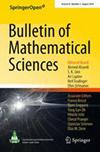具有可数恩格尔汇的紧群
IF 2.5
2区 数学
Q1 MATHEMATICS
引用次数: 11
摘要
一个群[公式:见文]的元素[公式:见文]的恩格尔汇是一个集合[公式:见文],使得对于每一个[公式:见文],所有足够长的换向子[公式:见文]都属于[公式:见文]。(因此,当我们可以选择[Formula: see text]时,[Formula: see text]就是一个恩格尔元素。)证明了如果紧(Hausdorff)群[公式:见文]中的每一个元素都有一个可数的(或有限的)Engel sink,则[公式:见文]有一个有限的正规子群[公式:见文]使得[公式:见文]局部幂零。这就解决了威尔逊提出的一个问题。本文章由计算机程序翻译,如有差异,请以英文原文为准。
Compact groups with countable Engel sinks
An Engel sink of an element [Formula: see text] of a group [Formula: see text] is a set [Formula: see text] such that for every [Formula: see text] all sufficiently long commutators [Formula: see text] belong to [Formula: see text]. (Thus, [Formula: see text] is an Engel element precisely when we can choose [Formula: see text].) It is proved that if every element of a compact (Hausdorff) group [Formula: see text] has a countable (or finite) Engel sink, then [Formula: see text] has a finite normal subgroup [Formula: see text] such that [Formula: see text] is locally nilpotent. This settles a question suggested by J. S. Wilson.
求助全文
通过发布文献求助,成功后即可免费获取论文全文。
去求助
来源期刊

Bulletin of Mathematical Sciences
MATHEMATICS-
CiteScore
2.10
自引率
0.00%
发文量
17
审稿时长
13 weeks
期刊介绍:
The Bulletin of Mathematical Sciences, a peer-reviewed, open access journal, will publish original research work of highest quality and of broad interest in all branches of mathematical sciences. The Bulletin will publish well-written expository articles (40-50 pages) of exceptional value giving the latest state of the art on a specific topic, and short articles (up to 15 pages) containing significant results of wider interest. Most of the expository articles will be invited.
The Bulletin of Mathematical Sciences is launched by King Abdulaziz University, Jeddah, Saudi Arabia.
 求助内容:
求助内容: 应助结果提醒方式:
应助结果提醒方式:


